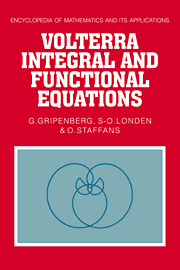Preface
Published online by Cambridge University Press: 26 May 2010
Summary
During the past 25 years the theories of Volterra integral equations, Volterra integrodifferential equations, and functional differential equations have undergone rapid developments. What began as a few scattered papers on specific equations, and on particular applied problems, has grown to branches of applied analysis of considerable size, having rich structures of their own. The growth has been strongly promoted by the large number of applications that these theories have found in physics, engineering, and biology. Our understanding of those comparatively simple, usually linear, problems that were present from the beginning has increased significantly. In addition, knowledge has been obtained about more general and about more complex equations. We observe, for example, that the main part of the asymptotic theory for nonlinear Volterra integral and integrodifferential equations is of fairly recent origin. The same observation can be made about equations involving parameters or additional variables, and more generally about equations in infinite-dimensional spaces.
It is very common to make a fairly sharp distinction between Volterra integral and integrodifferential equations on the one hand, and functional differential equations on the other hand. In many respects this distinction is artificial, being due more to the different backgrounds of the researchers than to any inherent differences. In the sequel we refer to these groups of equations as ‘Volterra integral and functional equations’, or ‘Volterra equations’ for short, and many of the results that we give apply equally well to functional differential equations and to Volterra integral or integrodifferential equations.
- Type
- Chapter
- Information
- Volterra Integral and Functional Equations , pp. xi - xviPublisher: Cambridge University PressPrint publication year: 1990

